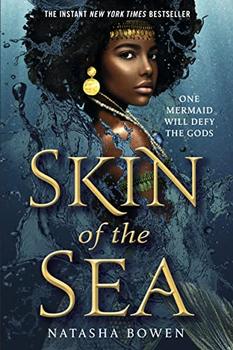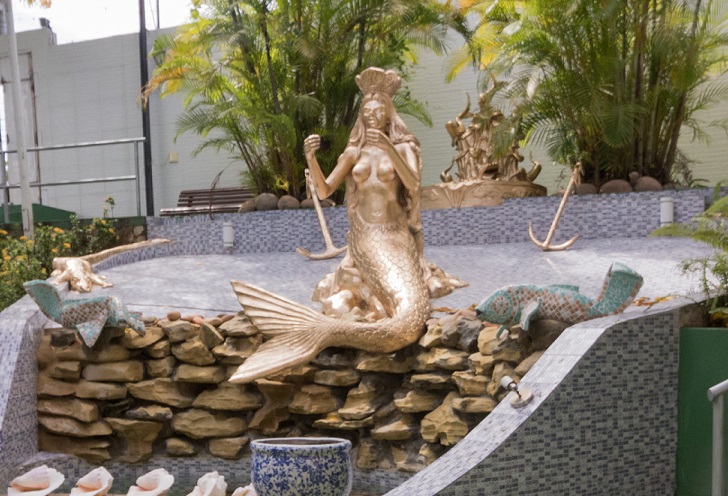Summary | Excerpt | Reviews | Beyond the Book | Read-Alikes | Genres & Themes | Author Bio

This article relates to Skin of the Sea
 Simi, the main character in Natasha Bowen's Skin of the Sea, is a Mami Wata, a water deity from West African mythology who is described in the novel as having a mermaid form. While the red-headed Ariel of Disney fame might be the dominant image of what a mermaid looks like for many people, they come in many forms from all over the world, and many different storytelling traditions. The Yoruba deity Yemoja is often pictured as a mermaid, and Bowen cites this as a source of inspiration for her take on a mermaid story.
Simi, the main character in Natasha Bowen's Skin of the Sea, is a Mami Wata, a water deity from West African mythology who is described in the novel as having a mermaid form. While the red-headed Ariel of Disney fame might be the dominant image of what a mermaid looks like for many people, they come in many forms from all over the world, and many different storytelling traditions. The Yoruba deity Yemoja is often pictured as a mermaid, and Bowen cites this as a source of inspiration for her take on a mermaid story.
Hans Christian Andersen's "The Little Mermaid" did much to solidify the image of what mermaids are and whose story traditions they belong in, as did Disney's later film adaptation. European concepts of mermaids have heavily influenced the contemporary imagination, but even these are more varied than most people realize. They include the German Lorelei; the French Melusine; the Merrows of Irish folklore and the selkies of tales from Scotland and the Orkney Islands, beings who live as seals in the sea but can shed their skins to become human on land.
However, mermaids and similar water spirits can be found in folklore cultures around the world, especially in those that arose near bodies of water. These spirits are often quite unlike the European versions that the term "mermaid" may connote. They can be malevolent or benevolent, and in their different forms (i.e., reptilian, snake-like, or fish-like) have been woven into other contemporary fantasy books and films. For example, fans of the Harry Potter series might be familiar with the appropriation of the term Nagini as the name of Voldemort's snake. And in the related Fantastic Beasts book and movies, we learn Nagini was once a woman who could turn into a snake. Nagini and Nāga are the names of divine creatures who appear in Hindu, Buddhist and Jain stories from South and Southeast Asia, that are depicted as a snake transforming into a human, a human wrapped in snakes, or as a giant snake that dwells near or in a body of water. Rowling also borrows the Kappa as one of the magical creatures Hogwarts students learn about, writing them as Japanese water demons that strangle humans. However, in Japanese folklore, Kappa are characterized as both tricksters and healers.
It is important to know that mermaids and their parallel water spirits appear across time as well as culture and language. The sirens faced by Odysseus are just one example of beautiful and murderous creatures who waited to lure humans to a watery grave. In The Penguin Book of Mermaids, Cristina Bacchilega and Marie Alohalani Brown write about how the otherness and hybridity of mermaid bodies can reflect human anxieties about water as a potentially destructive force. However, in some modern retellings, they are a symbol of fluidity, as seen in Jessica Love's ode to self-expression, the picture book Julián is a Mermaid.
Oannes is a fish-human hybrid figure from Babylonian mythology known as a keeper of knowledge, and there are Persian stories that include mermaids and sea fairies as well. African water spirits, unsurprisingly, also reappear in the Caribbean, in stories such as "Ti Jeanne" and "Maman Dlo's Gift" from Trinidad and Tobago. And not all water spirit tales feature mermaids in the traditional half-human, half-fish form. In Hawaiian culture, tales of mo'o (the word for lizard) are more common. Mo'o are reptilian, and seen as guardian creatures, and mermaids are sometimes considered kin to mo'o. If looking more broadly than a red-haired teenager who just "wants to be where the people are," there are many, many different stories of mermaids and water spirits to explore, ranging from Indigenous North America, to the Philippines, to the Mediterranean and across Northern Europe, all of which are sure to stoke the imagination.
Statue of Yemoja in Ilê Odó Ogé, Salvador, Brazil by Paul R. Burley, courtesy of Wikimedia Commons
Filed under Cultural Curiosities
![]() This "beyond the book article" relates to Skin of the Sea. It originally ran in February 2022 and has been updated for the
July 2022 paperback edition.
Go to magazine.
This "beyond the book article" relates to Skin of the Sea. It originally ran in February 2022 and has been updated for the
July 2022 paperback edition.
Go to magazine.
Your guide toexceptional books
BookBrowse seeks out and recommends the best in contemporary fiction and nonfiction—books that not only engage and entertain but also deepen our understanding of ourselves and the world around us.